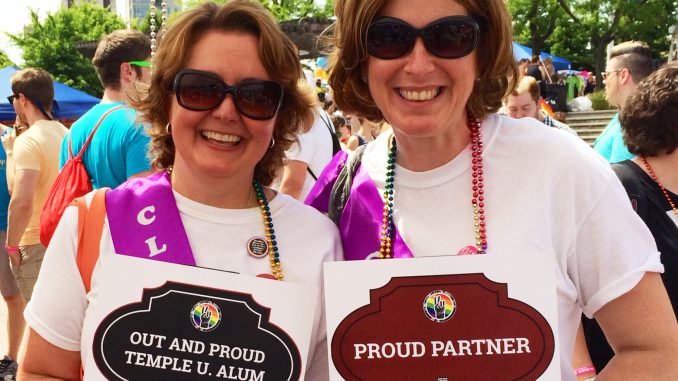
The outside of an early 1900s home is dressed in fallen red and orange leaves. Fall has arrived in the college town of Swarthmore.
Six-year-old Henry Ferlaine sits inside the house, awaiting fresh banana bread baked by his moms, Christine Donato and Sandy Ferlanie.
“It was just the most amazing day, wasn’t it?” said 46-year-old Christine Donato about her experience at Philadelphia’s City Hall on May 20, when Pennsylvania’s same-sex marriage ban was struck down by a federal judge.
Donato and her spouse Sandy Ferlanie were plaintiffs in the Whitewood v. Wolf case, a federal lawsuit filed in July 2013 that challenged the ban.
The Pennsylvania natives have been together since 1996 and originally planned to marry in another state but said a friend talked them into fighting for their rights in Pennsylvania.
Donato and Ferlanie were both born in suburban towns outside Philadelphia.
Although they both attended Temple at the same time, Ferlanie, a 1990 radio television film graduate, and Donato, a 1991 nursing graduate, said they never crossed paths. It was in the late ‘90s through a mutual friend that they were able to develop a friendship.
Donato said they had a solid year of “palling around” before they had their first date – it was Aug. 17, 1996, and the air conditioner broke in the Italian restaurant where they met.
“The first date you’re trying to play it cool, and we were just dripping in sweat,” Ferlanie said.
Eighteen years and a 6-year-old son later, Ferlanie and Donato married Oct. 3. If it weren’t for their and 23 other plaintiffs’ efforts, marriage in Pennsylvania wouldn’t have then been possible.
They were familiar with the Whitewood case because they were following the case of Edie Windsor, an 85-year-old woman who fought against the Defense of Marriage Act and won in 2013.
A friend of the couple’s, Helen Casale, is a lawyer with the Hangley Aronchick Segal Pudlin & Schiller Firm, which was working closely with the American Civil Liberties Union at the time.
“She had mentioned that the ACLU and another firm got together to announce, not too long after the Windsor case, that they were suing the state of [Pennsylvania],” Donato said.
For Ferlanie, the timing of the case couldn’t have been better. After she was diagnosed with cancer in 2012, she underwent extensive surgery and chemotherapy, but was able to return to work in July 2013, around the same time the ACLU announced the Whitewood case.
“It gave me a different perspective, Ferlanie said. “I wanted to put my name on something – to leave my mark.”
The couple got involved with the case in October.
Donato considers herself a “true optimist” and said she had high hopes, but the pair still feared disappointment.
“You don’t want to plan [the wedding] and not have it legally recognized,” Ferlanie said.
On May 20, Ferlanie and Donato were driving on I-95 on their way to drink champagne and listen for the case decision with lawyers in City Hall. The couple was listening to the radio when the decision was announced.
“We were near the airport and we were like ‘No KYW [radio], don’t tell us!’” Ferlanie said.
Ten minutes later, they were in Center City celebrating with the lawyers and plaintiffs from the Philadelphia area. Donato said the rally in Center City after the decision was explosive.
Each of the local plaintiffs spoke publicly, but Donato said she wanted to “blow her speech out of the water.” As part of the only unmarried couple in the case, Donato took the speech as a moment to showcase what she had defeated.
“[Donato] is very eloquent, and she ended her [speech] with ‘Mr. and Mrs. Ferlanie, may I have your daughters hand in marriage?’” Ferlanie said.
A friend in the audience told the couple that Christine was the best speaker at the rally and that the crowd went “crazy.”
“We knew that once the court and people of Pennsylvania got to know … there was no way that Pennsylvania could continue to treat their relationship as second-class,” said Molly Tack-Hooper, an ACLU staff attorney involved with the decision.
“With great plaintiffs like them, it was only a matter of time until Pennsylvania became a freedom-to-marry state,” Tack-Hooper added.
Two days after the decision, Donato was on the phone with the rector of the Trinity Episcopal church of Swarthmore.
Their friends and family were expecting them to get married immediately.
“It felt anti-climactic almost, to just go to the courthouse,” Ferlanie said.
With the help of a wedding planner, they put together the day of their dreams in five months.
The wedding was held at a barn in Skippack, Pennsylvania that was renovated with shining hardwood floors and beams, which Ferlanie said was done in their taste. They also hired a 12-piece orchestra that “played everything from Sinatra to Snoop Dogg.”
With around 175 people in attendance, it was an emotional day the couple never wanted to end. Donato and Ferlanie retreated to a local hotel in the Skippack area and sat by the lobby’s fireplace until 4:30 a.m., they said.
“People were like, ‘Aren’t you tired of smiling?’ because I was smiling the whole day and it wasn’t even an effort,” Ferlanie said. “The entire day felt like a movie scene.”
After two years, Ferlanie and Donato said they don’t feel too different. They live in Swarthmore, Pennsylvania, where they play on a women’s soccer club throughout the year.
Their son Henry, who Ferlanie had in 2008 after seeing a fertility specialist, attends school at Swarthmore Rutledge, where he said his classmates describe having two moms as “cool.”
Emily Scott can be reached at emily.scott@temple.edu


Be the first to comment